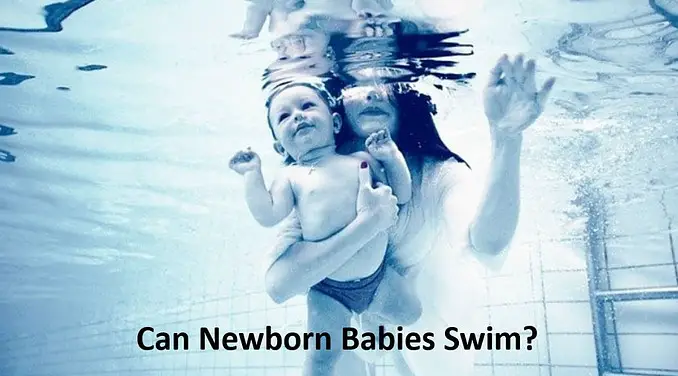Can Newborn Babies Swim? (Here’s What You Need To Know)

Have you ever seen one of these cute photos of the tiny baby swimming underwater?
Have you ever wondered how is that even possible? Can newborns really swim?
Water is a very familiar environment for newborn babies, giving them a sense of security and comfort. After all, they spent 9 months surrounded by the amniotic fluid in their mom’s womb. Hence, it is not surprising that new babies love to bathe and soak in warm, bubbly water.
When my girls were little, they adored playing with their floating duckies and splashing in the tub. They didn’t care that the water got in their ears, noses or on their faces! Although they’ve gradually become more sensitive to it as they got older…
Anyway, if you are curious whether babies are born with natural swimming abilities, this article is for you.
Here’s the truth about newborns’ swimming skills.
Can Newborn Babies Swim?
Babies are born with some primitive reflexes that help them survive in the outside world. One of them is the diving reflex. It allows them to hold their breath and open their eyes underwater. The second one is the swimming reflex. It can be seen when the baby is placed in the water on her tummy. Instantly, she starts moving her arms and legs in a swimming motion. The third one is the “gag” reflex, which prevents them from inhaling the water. All these reflexes make them appear as natural swimmers, but that is very deceiving. In reality, babies can’t swim. Swimming is just another skill they need to learn as they grow up.
1. Newborn Reflexes
Babies are born with several reflexes that they develop in the womb. These are involuntary movements or actions that occur spontaneously.
As their brains develop and take over their survival instincts, babies will lose most of these reflexes within a few months.
Newborn reflexes are crucial for survival, and their presence tells us that the infant’s nervous system is functioning well.
Some of the typical newborn reflexes observed by parents are; sucking and rooting reflexes, grasp or startle reflex.
- The rooting reflex helps babies find a nipple or a bottle to start feeding. It kicks in when the baby’s mouth is touched or stroked. As a response to it, the baby will turn her head and open her mouth and root. This reflex is present until they are approx. 4 months.
- An infant’s sucking reflex is the ability to suck and swallow milk once the source is found. It is relatively complicated for a newborn to coordinate sucking movements with breathing and swallowing. While sucking is a reflexive action, not every baby can do it well at first. However, as they practice, the reflex becomes a skill they all master.
- Grasp reflex – occurs when your newborn wraps their fingers around yours and holds onto it tightly. The grasp reaction lasts until the baby is 5-6 months. Toes also show similar behaviour when the sole of the foot is stroked. Grasp reflex in toes lasts for 12 months.
2. Swimming Instincts
In many cases, parents are less familiar with the reflexes triggered by the water environment, such as amphibian reflex, diving reflex, and gag reflex.
These responses happen when babies are in the water and these are responsible for making them look like natural swimmers!
2.1 Amphibian (Swimming) Reflex
In this reflex, the baby’s arms, legs, and body move symmetrically, propelling them forward.
So, when a baby is placed in the water, she will kick her legs and move her arms in a swimming motion.
Typically, the reflex starts to fade at six months and disappears entirely by twelve months.
2.2 The Pharyngeal or “Gag” Reflex
This reflex is triggered when water touches the baby’s face, nose or go into her mouth.
The baby automatically holds her breath to stop inhaling water. Then, the back of the throat closes to block the airway, ensuring a watertight seal around the lungs.
2.3 Mammalian Diving Reflex
This reflex occurs in all mammals, including humans (hence the name mammalian). It is also known as the bradycardic reflex. This instinctive survival response is initiated once the baby’s face is submerged in cold water. As a result, the baby will hold her breath, and the heart rate will slow down by about 25%, allowing the body to preserve oxygen for the most vital organs – the heart and brain.
The diving reflex will start to diminish once the baby becomes 6 months old.
Eventually, with practice, all these involuntary instincts will have to be replaced by the conscious holding of breath, conscious kicking and paddling. All of these skills will need to be learned.
*** Fun fact: you can prompt the diving reflex in babies by blowing in their faces, particularly during crying times. They will automatically hold their breath and stop crying when you do this!
3. Shall I take my baby swimming?
The hard truth is, drowning is the third leading cause of accidental death worldwide.
Because of that, learning to swim should be one of the most essential skills that children acquire at an early age.

I took my older daughter to swimming classes when she turned 6 months. And she absolutely loved it. Her confidence in the water has continued to grow throughout these years, and she has become an enthusiastic swimmer.
In the case of newborns, it might be a little premature to teach them how to swim.
However, getting babies comfortable in the water, teaching them safety and survival skills, how to recover and turn over if they accidentally fall in, and how to float on the back – might prove highly beneficial for this age group.
These are the skills babies should learn early on rather than learning to swim per see.
And believe me – tossing babies into the water without any warning should not be on the agenda at all at this point!
So, when should you take your baby for swimming lessons?
There is no hard guideline as to when babies should start learning to swim.
This is still a controversial subject, and within the medical community, opinions are divided. For example, the American Academy of Pediatrics (AAP) suggests swimming programs for children should start from 1 year. However, swimming lessons for babies are usually offered from 4 months when their immune system has developed sufficiently. So, go figure…
Nevertheless, it is a good idea to teach babies to swim while they still possess their natural reflexes. By taking advantage of their reflexes babies are able to quickly master swimming skills and even go underwater.
Moreover, as the babies grow they may develop a fear of water (aquaphobia). So, the longer a child is kept away from water, the greater the chance of developing it.
It is crucial to remember that babies can’t regulate their own body temperature, so the water must be heated to 32° C.
Babies learn to swim before they can walk
Final Few Lines
The great majority of infants love being around the water.
So, spending time with babies in a swimming pool can be a fun, healthy family activity.
However, do not be misled by the media or the ads of the swim schools for children showing babies underwater with their eyes wide open without being accompanied by adults.
This is just a misleading perception that babies are born with the ability to swim.
But the truth is: babies cannot swim. This is a skill they must learn.
